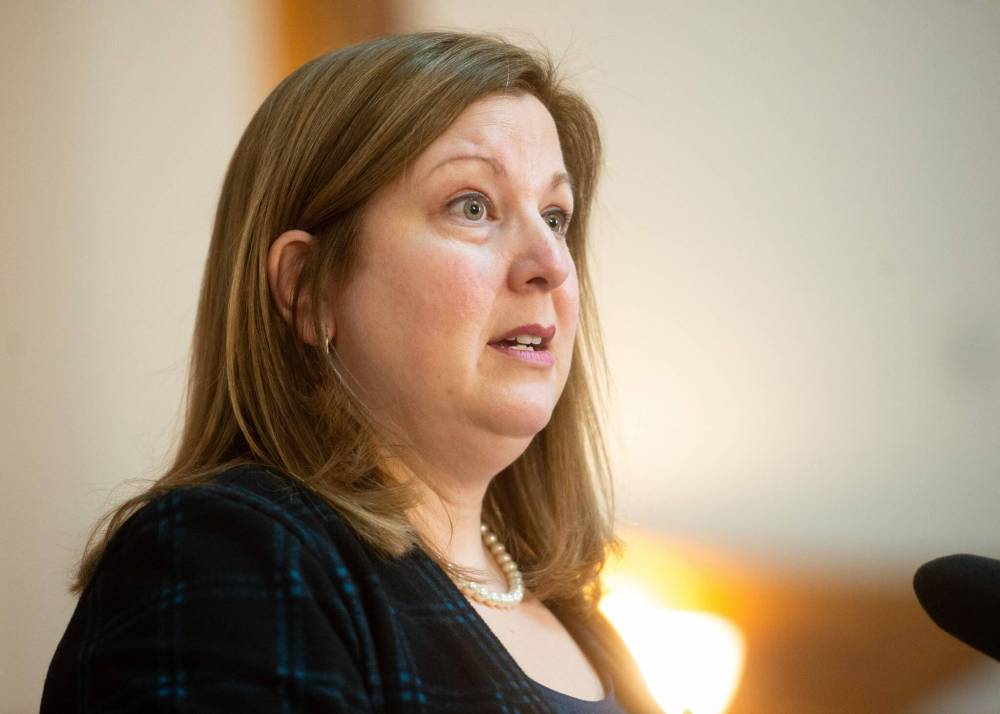Tories give up plans to allocate funds based on student success
Advertisement
Read this article for free:
or
Already have an account? Log in here »
To continue reading, please subscribe:
Monthly Digital Subscription
$0 for the first 4 weeks*
- Enjoy unlimited reading on winnipegfreepress.com
- Read the E-Edition, our digital replica newspaper
- Access News Break, our award-winning app
- Play interactive puzzles
*No charge for 4 weeks then price increases to the regular rate of $19.00 plus GST every four weeks. Offer available to new and qualified returning subscribers only. Cancel any time.
Monthly Digital Subscription
$4.75/week*
- Enjoy unlimited reading on winnipegfreepress.com
- Read the E-Edition, our digital replica newspaper
- Access News Break, our award-winning app
- Play interactive puzzles
*Billed as $19 plus GST every four weeks. Cancel any time.
To continue reading, please subscribe:
Add Free Press access to your Brandon Sun subscription for only an additional
$1 for the first 4 weeks*
*Your next subscription payment will increase by $1.00 and you will be charged $16.99 plus GST for four weeks. After four weeks, your payment will increase to $23.99 plus GST every four weeks.
Read unlimited articles for free today:
or
Already have an account? Log in here »
Hey there, time traveller!
This article was published 29/04/2023 (960 days ago), so information in it may no longer be current.
The Manitoba Progressive Conservatives are abandoning controversial plans to disburse funding to colleges and universities based on institutional data related to student and alumni success.
“We want to instead focus on exploring what accountability looks like and what measures would be acceptable to partners in this field,” Advanced Education Minister Sarah Guillemard wrote in a letter to stakeholders Friday.
Government officials have been working on a so-called post-secondary accountability framework since the auditor general criticized their office’s limited oversight of school operations in a 2020 report.

Advanced Education Minister Sarah Guillemard (Mike Sudoma / Winnipeg Free Press files)
The final document was anticipated to overhaul the way the province pays for education by requiring schools to report and attain certain achievement metrics in exchange for operating dollars — a model popular across the United States.
The proposal prompted administrations and academics to vocalize their fears that performance-based funding — be it tied to student admission and progression, institutional efficiency data or otherwise — could have unintended consequences.
Citing their concerns and COVID-19 pandemic disruptions to the sector, Guillemard confirmed the province is no longer pursuing it.
Instead, she said the advanced education department is focused on improving its public reporting on universities and colleges while searching for ways to streamline and reduce the disclosure burden placed on schools.
The announcement comes about five months after Premier Heather Stefanson indicated the Tories were taking “a step back” to re-evaluate the subject.
(Her predecessor, premier Brian Pallister, had signaled an interest in adapting Tennessee’s formula, which takes into account annual research dollars obtained, degrees granted and related figures.)
“Greater transparency of the financials of universities is essential. We saw what happened at Laurentian (University in Sudbury, Ont.) when the numbers were hidden from everyone… and so, we would like a system where we can scrutinize budgets carefully and openly,” said Scott Forbes, president of the Manitoba Organization of Faculty Associations.
However, Forbes said linking funding to reporting would not increase efficiency and instead raise barriers to entry for students who have long been underrepresented in higher education programs.
These funding formulas incentivize schools to heighten entrance standards and prioritize the acceptance of applicants who are most likely to graduate as quickly as possible, he said, noting such adjustments favour students from wealthy families.
“It’s a fundamental issue of equity. We want everyone to be able to participate in higher education — it’s one of the ladders for social progress,” Forbes added.
Student group leader Marie Paule Ehoussou, who indicated she was “really, really thrilled” about the latest development, echoed those comments.
Ehoussou and her colleagues at the Canadian Federation of Students have long been lobbying officials to throw out the metric-based funding model they claimed the government would use to push certain academic programs and justify future cuts.
Multiple public school boards also penned letters to the province condemning the policy’s potential impact on their graduates and Manitoba at-large.
Guillemard told the Free Press the province is responding to “loud and clear” pushback, including post-secondary leaders’ articulate concerns about a one-size-fits-all approach.
Consultations on the accountability framework, which began late last summer, are ongoing.
Officials have yet to hear from Indigenous leaders regarding the metrics the department should be collecting to improve student success and institutional transparency — which will not be tied to funding — before drawing up a blueprint, the minister said.
maggie.macintosh@freepress.mb.ca
Twitter: @macintoshmaggie

Maggie Macintosh
Education reporter
Maggie Macintosh reports on education for the Free Press. Originally from Hamilton, Ont., she first reported for the Free Press in 2017. Read more about Maggie.
Funding for the Free Press education reporter comes from the Government of Canada through the Local Journalism Initiative.
Every piece of reporting Maggie produces is reviewed by an editing team before it is posted online or published in print — part of the Free Press‘s tradition, since 1872, of producing reliable independent journalism. Read more about Free Press’s history and mandate, and learn how our newsroom operates.
Our newsroom depends on a growing audience of readers to power our journalism. If you are not a paid reader, please consider becoming a subscriber.
Our newsroom depends on its audience of readers to power our journalism. Thank you for your support.



